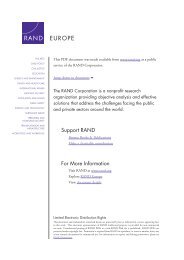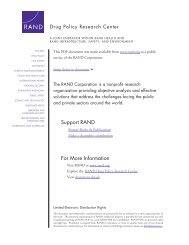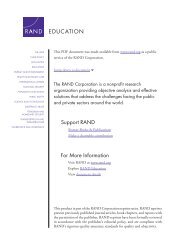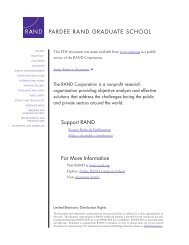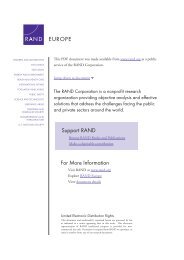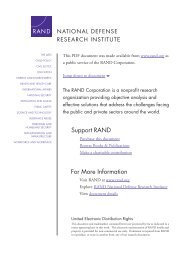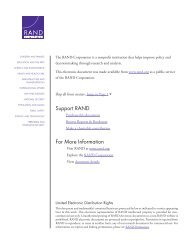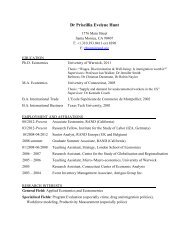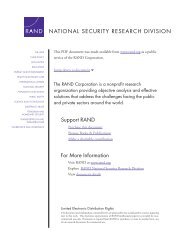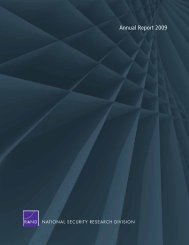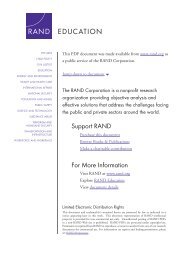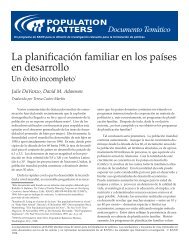- Page 1 and 2: THE ARTS CHILD POLICY CIVIL JUSTICE
- Page 3 and 4: C O R P O R A T I O N in their own
- Page 5 and 6: Preface It must be stated at the ou
- Page 7 and 8: Contents Preface ..................
- Page 9 and 10: Contents vii CHAPTER SIx Enemies ..
- Page 11: Acknowledgments I would like to exp
- Page 14 and 15: xii Voices of Jihad creators, who m
- Page 16 and 17: 2 Voices of Jihad ment. This book t
- Page 18 and 19: 4 Voices of Jihad Republican Army,
- Page 20 and 21: 6 Voices of Jihad fundamentalist le
- Page 22 and 23: 8 Voices of Jihad ers” to mean We
- Page 24 and 25: 10 Voices of Jihad Military College
- Page 26 and 27: 12 Voices of Jihad shifted out of p
- Page 28 and 29: 14 Voices of Jihad was captured and
- Page 30 and 31: 16 Voices of Jihad if we were going
- Page 32 and 33: 18 Voices of Jihad gunned down with
- Page 34 and 35: 20 Voices of Jihad reward you, oh M
- Page 36 and 37: 22 Voices of Jihad “They left in
- Page 38 and 39: 24 Voices of Jihad “8. General ex
- Page 40 and 41: 26 Voices of Jihad Dreams kill him.
- Page 42 and 43: 28 Voices of Jihad “The company h
- Page 44 and 45: 30 Voices of Jihad “As soon as we
- Page 46 and 47: 32 Voices of Jihad “Voice of Jiha
- Page 48 and 49: 34 Voices of Jihad “We entered th
- Page 52 and 53: 38 Voices of Jihad The Qur’an and
- Page 54 and 55: 40 Voices of Jihad “Do not regard
- Page 56 and 57: 42 Voices of Jihad mies, on account
- Page 58 and 59: 44 Voices of Jihad Muslim, or the s
- Page 60 and 61: 46 Voices of Jihad notwithstanding
- Page 62 and 63: 48 Voices of Jihad Some of them did
- Page 64 and 65: 50 Voices of Jihad sealed by marryi
- Page 66 and 67: 52 Voices of Jihad concerned with t
- Page 68 and 69: 54 Voices of Jihad “The Perfectio
- Page 70 and 71: 56 Voices of Jihad “Thus, it must
- Page 72 and 73: 58 Voices of Jihad Islam, is evil.
- Page 74 and 75: 60 Voices of Jihad that there may b
- Page 76 and 77: 62 Voices of Jihad Whatever system
- Page 78 and 79: 64 Voices of Jihad injure Him at al
- Page 80 and 81: 66 Voices of Jihad enemy is (none o
- Page 82 and 83: 68 Voices of Jihad “The sin upon
- Page 84 and 85: 70 Voices of Jihad “Indeed nation
- Page 86 and 87: 72 Voices of Jihad “Our freedom i
- Page 88 and 89: 74 Voices of Jihad jihadism is a fr
- Page 90 and 91: 76 Voices of Jihad “. . . For to
- Page 92 and 93: 78 Voices of Jihad integral parts.
- Page 94 and 95: 80 Voices of Jihad “The expressio
- Page 96 and 97: 82 Voices of Jihad “Religious sch
- Page 98 and 99: 84 Voices of Jihad “Jihad today i
- Page 100 and 101:
86 Voices of Jihad Terrorism “Thi
- Page 102 and 103:
88 Voices of Jihad quency of such a
- Page 104 and 105:
90 Voices of Jihad “What weapon c
- Page 106 and 107:
92 Voices of Jihad “. . . the mar
- Page 108 and 109:
94 Voices of Jihad ties are identic
- Page 110 and 111:
96 Voices of Jihad “. . . My virt
- Page 112 and 113:
98 Voices of Jihad gold and outfitt
- Page 114 and 115:
100 Voices of Jihad “Message Addr
- Page 116 and 117:
102 Voices of Jihad “3. Eliminate
- Page 118 and 119:
104 Voices of Jihad “God knows th
- Page 120 and 121:
106 Voices of Jihad ant,’ a ‘no
- Page 122 and 123:
108 Voices of Jihad “Among the th
- Page 124 and 125:
110 Voices of Jihad objective is to
- Page 126 and 127:
112 Voices of Jihad “Look! As gra
- Page 128 and 129:
114 Voices of Jihad Andalus 39 and
- Page 130 and 131:
116 Voices of Jihad Islam Under Thr
- Page 132 and 133:
118 Voices of Jihad “. . . the Zi
- Page 134 and 135:
120 Voices of Jihad “A. If there
- Page 136 and 137:
122 Voices of Jihad . . . . “The
- Page 138 and 139:
124 Voices of Jihad the pro-US regi
- Page 140 and 141:
126 Voices of Jihad “We live in a
- Page 142 and 143:
128 Voices of Jihad Globalization
- Page 144 and 145:
130 Voices of Jihad Baghdad, Damasc
- Page 146 and 147:
132 Voices of Jihad “With respect
- Page 148 and 149:
134 Voices of Jihad operation aims
- Page 150 and 151:
136 Voices of Jihad failure of the
- Page 152 and 153:
138 Voices of Jihad “Mediator:
- Page 154 and 155:
140 Voices of Jihad position stems
- Page 156 and 157:
142 Voices of Jihad “That is why,
- Page 158 and 159:
144 Voices of Jihad “He who claim
- Page 160 and 161:
146 Voices of Jihad whenever he wis
- Page 162 and 163:
148 Voices of Jihad and amorality h
- Page 164 and 165:
150 Voices of Jihad or of a woman w
- Page 167 and 168:
CHAPTER SIx Enemies The jihadis hav
- Page 169 and 170:
“Several years ago, a sinful call
- Page 171 and 172:
“Christianity grew up in the shad
- Page 173 and 174:
Enemies 159 Jews The previous chapt
- Page 175 and 176:
ialistic fear of the spirit of Isla
- Page 177 and 178:
equals - as you kill us, you will b
- Page 179 and 180:
“I examined at length the history
- Page 181 and 182:
women to serve passengers, visitors
- Page 183 and 184:
“The ruling to kill the Americans
- Page 185 and 186:
waged by his massive propaganda mac
- Page 187 and 188:
. . . . “Colonialism and its foll
- Page 189 and 190:
Enemies 175 akin to that of the Tal
- Page 191 and 192:
“(5) The financial and the econom
- Page 193 and 194:
American Presence in Saudi Arabia
- Page 195 and 196:
“In the past, [Prince] Sultan [th
- Page 197 and 198:
“We went forth to fight for the s
- Page 199 and 200:
“We must understand that the situ
- Page 201 and 202:
“The State (of Egypt in which we
- Page 203 and 204:
feel comfortable in Egypt so long a
- Page 205 and 206:
Pakistan “Let me begin by asking
- Page 207 and 208:
Jordan and adopt the prophets’ mo
- Page 209 and 210:
CHAPTER SEVEn “Prescribed for You
- Page 211 and 212:
“Prescribed for You Is Fighting .
- Page 213 and 214:
“Prescribed for You Is Fighting .
- Page 215 and 216:
Morale “Prescribed for You Is Fig
- Page 217 and 218:
“Prescribed for You Is Fighting .
- Page 219 and 220:
Tactics “Prescribed for You Is Fi
- Page 221 and 222:
“Prescribed for You Is Fighting .
- Page 223 and 224:
“Prescribed for You Is Fighting .
- Page 225 and 226:
“Prescribed for You Is Fighting .
- Page 227 and 228:
“Prescribed for You Is Fighting .
- Page 229 and 230:
“1. Commit yourself to death and
- Page 231 and 232:
“Prescribed for You Is Fighting .
- Page 233 and 234:
“Prescribed for You Is Fighting .
- Page 235 and 236:
“Prescribed for You Is Fighting .
- Page 237 and 238:
“Prescribed for You Is Fighting .
- Page 239 and 240:
“Prescribed for You Is Fighting .
- Page 241 and 242:
“Prescribed for You Is Fighting .
- Page 243 and 244:
“Prescribed for You Is Fighting .
- Page 245 and 246:
CHAPTER EIgHT Iraq and Afghanistan
- Page 247 and 248:
Iraq and Afghanistan 233 “Another
- Page 249 and 250:
Iraq and Afghanistan 235 noiter the
- Page 251 and 252:
Iraq and Afghanistan 237 not accept
- Page 253 and 254:
Iraq and Afghanistan 239 the insurg
- Page 255 and 256:
Iraq and Afghanistan 241 “These i
- Page 257 and 258:
Iraq and Afghanistan 243 and we ask
- Page 259 and 260:
Iraq and Afghanistan 245 were all o
- Page 261 and 262:
Iraq and Afghanistan 247 the Iraqi
- Page 263 and 264:
Iraq and Afghanistan 249 even if it
- Page 265 and 266:
Looking Ahead Iraq and Afghanistan
- Page 267 and 268:
Iraq and Afghanistan 253 the pretex
- Page 269 and 270:
Iraq and Afghanistan 255 “From th
- Page 271 and 272:
Iraq and Afghanistan 257 their hypo
- Page 273 and 274:
CHAPTER nInE Operations The role pl
- Page 275 and 276:
willing, move the jihad much closer
- Page 277 and 278:
moment, he pulls out. He cannot ove
- Page 279 and 280:
land from the infidels who occupied
- Page 281 and 282:
Suicide Bombers “Moderator: How a
- Page 283 and 284:
“The Front does not belong to any
- Page 285 and 286:
a quarter of the world knew what wa
- Page 287 and 288:
“I was very saddened to see some
- Page 289 and 290:
Operations 275 “Electronic Jihad
- Page 291 and 292:
Training of your brothers, you too
- Page 293 and 294:
ment and is something that one can
- Page 295 and 296:
Kidnapping “. . . Good training o
- Page 297 and 298:
Operations 283 “Security measures
- Page 299 and 300:
Intelligence “3. Grab the testicl
- Page 301 and 302:
Operations 287 “2. Evaluating the
- Page 303 and 304:
Weapons “• You should different
- Page 305 and 306:
same thing. When the ignition key i
- Page 307 and 308:
Operations 293 “c) A germ attack
- Page 309 and 310:
Rationale for WMD “. . . A certai
- Page 311 and 312:
Diplomacy “It {using nuclear weap
- Page 313:
peaceful coexistence!! America is k
- Page 316 and 317:
302 Voices of Jihad impression that
- Page 318 and 319:
304 Voices of Jihad enhance the cap
- Page 321 and 322:
References Abu Ghaith, Sulayman, Au
- Page 323 and 324:
References 309 As of February 14, 2
- Page 325 and 326:
References 311 links,” July 6, 20
- Page 327 and 328:
References 313 Al-Maarek, Azmiray,
- Page 329 and 330:
References 315 of January 31, 2008:
- Page 331 and 332:
References 317 ———, “Which
- Page 333 and 334:
References 319 Al-Wahhaab, Shaykh
- Page 335 and 336:
References 321 ———, Knights U
- Page 337 and 338:
References 323 Series, No. 1000, Oc
- Page 339 and 340:
References 325 ———, Sermon, 2
- Page 341 and 342:
———, Video, “Third News Pro
- Page 343 and 344:
References 329 Jane’s Terrorism a
- Page 345 and 346:
References 331 No. 25, January 27,
- Page 347:
References 333 Um al-Shahid, “Mes




